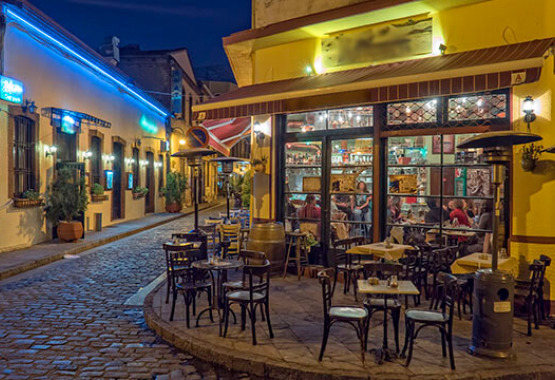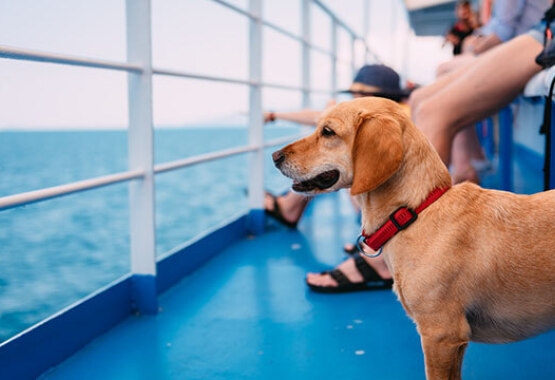
Travelling Beyond Barriers
Hints and tips for accessible holidays in Greece
Read about travelling to Greece, and you’ll undoubtedly come across the term philoxenia. It is a word that has survived unchanged for thousands of years and which refers to the quintessentially Greek concept of hospitableness and welcome. In Greece, we pride ourselves on our philoxenia. On being warm and welcoming and extending heartfelt hospitality to guests and travellers. And when it comes to travellers with disabilities, philoxenia means doing our best to make travelling in Greece accessible to all.Historically, travellers with different access needs were often not able to access the gorgeous beaches and world-class attractions that make Greece one of the world’s most popular travel destinations—but today this is changing. From organised government efforts and major infrastructure projects to grassroots initiatives and improved public awareness, Greece is becoming increasingly accessible, offering ever more options for inclusive holiday experiences.
Getting around in Athens
Efforts to improve accessibility across Greece are ongoing, and Athens is leading the way in adapting the urban centre. From installing tactile paving to cracking down on illegal curbside parking and keeping ramps clear, authorities are taking steps to make it easier for people with disabilities to travel in the city and move around independently.Notably, all Athens Metro stations are accessible and feature lifts, while buses and trolleybuses in the city are equipped with kneeling systems and/or ramps. You can find information on specific services on the Transport for Athens (OASA) website, while accessibility details for Athens Metro and city train services can be found on the city’s Urban Rail Transport (STASY) website.
Taxis in Greece are relatively affordable compared to many other European countries and are another great option for getting around, especially if you want a door-to-door service. Regular taxis, which in Greece are sedan type cars, can be waived down on the street but can also be booked in advance through various available reputable agencies and apps. Wheelchair users and other travellers with specific access needs can also make use of dedicated accessible transfer companies that use adapted minibuses or passenger vans to provide point-to-point transfers as well as port and airport transfers, city tours, and excursions.
Pantou.org, the accessible tourism directory created by the European Network for Accessible Tourism (ENAT), is an excellent resource for finding accessible tourism services, including accessible taxis and private transfers in Greece.
Travelling further afield in Greece
To travel longer distances around the country and explore Greece’s many stunning destinations, you can choose from a full range of transport options, including air, rail, road, and sea. Keep in mind that the level of provisions and available facilities on different carriers and routes can vary, so it’s important to confirm based on the specifics of your itinerary, whether you’re travelling by train, coach or ferry.You can contact the regional KTEL companies of your points of travel to find out more about accessible options on intercity buses (KTEL), and you can check accessibility information on nationwide rail routes on the Hellenic Train website. If travelling by sea, visit the Hellenic Coast Guard website to check the accessibility of different ports around the country.
Beaches
Greek summers are all about sunshine and days at the beach, and everyone should be able to enjoy those simple pleasures. With this in mind, Greece has installed Seatrac chairs at over 200 beaches across the country, enabling wheelchair users and others with mobility issues to enjoy independent sea access. The remote-controlled solar-powered chairs allow you to bypass the sand and safely get from the boardwalk to the water to enjoy a swim. Many Seatrac-equipped beaches feature additional amenities, such as accessible changing rooms, showers and bathrooms and wheelchair-accessible shaded areas on the beach.From Corfu to Mykonos and from Halkidiki to Crete, Seatrac chairs can be found at beaches all over Greece: on the mainland and the Peloponnese, as well as on many Ionian and Aegean islands and Crete. Visit seatrac.gr to access a full directory and interactive map of Seatrac beaches and the amenities available at each.

Attractions and Museums
Across the board, Greece is stepping up its efforts to make the country more accessible, and this includes improving access to its many world-class tourist attractions, not least the Acropolis of Athens. Previously inaccessible to many—it was after all built as an impenetrable citadel atop a craggy outcrop—the Acropolis now welcomes visitors with mobility issues thanks to a wheelchair-friendly lift and level, wheelchair-friendly paths that have been installed on the site.Many more sites and museums around the country have been or are being adapted to be more disability-friendly, with a range of amenities such as access ramps, lifts, and wheelchair-friendly bathrooms. In Athens, for example, this includes the award-winning Acropolis Museum, the National Archaeological Museum, the Benaki Museum, and the Museum of Cycladic Art, as well as the Ancient Agora of Athens, and the Temple of Poseidon at Sounion. When in doubt, don’t forget that staff at these sites are always happy to answer questions and help out.
Disability-friendly resorts and activities
Greece isn’t just making changes to improve accessibility; it’s also seeing a surge in new initiatives and commercial ventures catering specifically for people with disabilities and different access needs.Over the past years, this has resulted in a number of accessible hotels and resorts in coveted destinations such as sunny Crete and the seaside spa town of Loutraki, just a short drive from Athens. These hotels offer a range of purpose-designed facilities and amenities, including accessible rooms and bathrooms, wheelchair-friendly dining facilities, special ramps for sea and pool access, and specially fitted spa facilities.
If you want to add more variety—or even a little adventure—to your trip, you’ll find plenty of fun options to choose from. A small but dedicated number of specialised tour providers offer disability-friendly tours to some of the best attractions and destinations in the country, while some can also design bespoke travel itineraries and arrange everything from accessible hotels and transfers to wheelchair rentals and support staff. Disabled-friendly yacht holidays and private cruises are also available, with some yacht charter companies offering specially adapted wheelchair accessible yachts.
And remember… when in doubt, just ask!
Greece is a mountainous country with rugged terrain and many centuries-old towns, villages and historic districts—factors that can determine a destination’s degree of accessibility and which can sometimes hinder efforts to improve this.While much progress has been made over the past few years and the country is committed to continuing this work, accessibility in Greece is still a work in progress. Inclusive infrastructure and options can vary depending on the specifics of each destination, and many places, from public monuments to private businesses, have not yet been adapted to accommodate different access needs. Remember to check online for a destination’s specifics, and if in doubt, call in advance to enquire about available amenities, concessions and assistance. You’ll find that people are happy to answer your questions, work with you to find solutions, and extend that famous Greek philoxenia.




